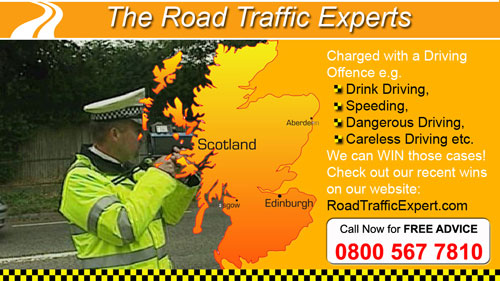

Defending a Scottish Road Traffic Case - Going to court.
By Richard Freeman
There are a number of very important steps that can be taken by an accused person in order to maximise their chances of success in defending a road traffic case in Scotland - even when the odds seem stacked against you:
1. Early Action
As soon as suspicion of any road traffic offence has crystallised it is very important to consider whether there is any evidence that should be recorded or preserved for future use in court.
Indeed the early preservation of evidence from the scene of the incident cannot be over emphasised. A video recording or photographs can preserve evidence relating to the layout of the road, important signage (or lack thereof), damage to vehicles, weather conditions, and flow of traffic. Video footage showing the perspective from the driver's view point can be invaluable. Likewise audio recordings of conversations with the police and other witnesses can turn a case in your favour. Such evidence can be recorded on mobile smart phones which can then be saved on a memory stick or DVD for future court use. It can take several months before a trial is fixed. If evidence is saved at the time of the incident it eliminates the risk of losing it prior to the trial. It can also be used to assist in any pre-trial discussions with the Fiscal.
2. Court Procedure
Most people who are prosecuted in relation to Scottish road traffic offences are unfamiliar with the court process. This unfamiliarity can leave people feeling slightly anxious and can also affect the presentation of their case. A better understanding of the court process by an accused person can greatly assist the accused.
When an accused person wishes to plead guilty to a charge, this can be done when an accused person is first called to court. For offences such as speeding, mobile phone use, minor careless driving offences, red light cases, tachograph offences, and construction and use offences, the case usually starts by way of a citation or court summons which is served by post. Usually a fixed penalty has first been offered by the police and rejected by the accused. If there is the possibility of losing your licence by way of a disqualification or if you just want to minimise the number of penalty points a plea in mitigation can be tendered to the court. It is important that you bring both parts of driving licence with you. A character reference or testimonial can also be very effective and advice should be sought from a solicitor to identify what exactly is needed and by whom. Any evidence that can gainsay what is disputed by the accused in the summary of evidence is also very important. Legal advice from a road traffic expert should be sought here also. The citation will comprise of the date you require to attend court, the details of the charge or offence, the summary of evidence ( which is a synopsis of the police report) , and any previous convictions. It is important that you carefully scrutinise all the information and discuss this fully with a road traffic expert before a guilty plea is made to the court. Often an accused will agree that the offence has been committed but disputes a number of aggravating features which can impact significantly on the sentence. This is where advice from a road traffic solicitor is vital.
In the case of more serious offences resulting in an accused being arrested, instead of the case being reported to the PF an accused can be kept in police custody to appear in court or they can be released on a bail undertaking to appear at court on a certain day. In these circumstances advice should be sought immediately especially if the police intend to carry out an interview.
3. Preparing for Trial.
Any person accused of an offence is entitled to test the Crown case in relation to the extent of the sufficiency and quality of the Crown evidence. Very often assumptions are made that the police and the Crown have complied with all the technical and procedural requirements in place, not only to safeguard the rights of an accused to a fair trial, but also to prove the case. The courts have to protect such interests even where it results in an accused being acquitted of the charge against him.
The only way that an accused is able ensure that these matters have been complied with is to plead not guilty when the case first calls. This allows the evidence and procedures to be fully scrutinised by a road traffic specialist who knows exactly what to look for to win a case. An accused's defence can also be prepared and exculpatory evidence engathered. For example as stated above, it is crucial to have a detailed understanding of a road where the offence is alleged to be committed. Ideally this should be carried out before the court process begins in order to ensure that the evidence is secured. However it is still important to complete this exercise at any stage in the proceedings, for offences such as speeding careless driving, dangerous driving and even drink driving. Also in drink related offences it would be necessary to ensure an accurate account of any pre-incident and post incident driving is noted as soon as possible.
It is useful to be aware of certain other aspects of court procedure. We have listed a number of questions often asked by clients :
Q. When do I need to attend court?
A. If you have been released from police custody with a date to appear at court you are required to attend court. This is because you will have signed a bail form giving an undertaking to attend court on a set date. It is an offence in these circumstances if you fail to attend without a reasonable excuse. Such bail undertakings as they are called would be for more serious road traffic cases such as drunk driving.
If you have received a citation for court either by post or by delivery from a police officer, the court date provided is called a pleading diet. If you are pleading not guilty we will do that on your behalf and accordingly you are not required to attend court or respond to the citation in any way. New court dates will be set usually some months away to accommodate the Court's diary, and to allow for our investigation and preparation of your case.
On the other hand if you have instructed us to plead guilty on your behalf you have the option to appear or not unless there is a likelihood of you being disqualified, in which case you are required to attend. Even where you are not required to attend generally it is still better to do so as it demonstrates to the court that you are taking the matter seriously. If it is not practical however due for example to work commitments or because you live far away, we can appear for you and explain to the court why you are not present and impress upon the court that notwithstanding your absence, you are taking the matter seriously etc.
Q. What happens on the day of the trial diet?
A. A number of trials are invariably called in for 10:00am every day and your case will be one of them. The prosecutor will decide the order in which he wants to run the trials. This will depend on a number of factors including whether or not the witnesses are present. On many occasions the prosecution is keen to resolve cases by adjusting a plea for example by dropping a number of charges or by reducing the a case down from dangerous to careless driving. If this is something that is not offered by the prosecutor in your case the matter will require to proceed to trial.
Q. What is the format of a trial?
A. In every case the Prosecutor goes first. It is for the Crown to prove the case against you to a standard beyond reasonable doubt. You have the presumption of innocence in your favour. The Prosecutor will lead evidence from police witnesses and any civilian witnesses in turn. After each witness has given evidence the defence has an opportunity to cross examine the same witnesses. Effective cross examination is a fine art requiring a high degree of skill, the purpose of which is to undermine the crown evidence and to lend support to the defence case. Done well this can sometimes bring the crown case to its knees and is therefore a very important function of a trial. It is also worth mentioning that very often a witness should be left alone because their evidence is not damaging or lacks sufficiency, so to cross examine might be counter productive. Very often in Road Traffic cases, a technical defence is run in which case the less said by a crown witness the better.
At the end of the crown case the prosecutor will move to close their case. At this stage the defence require to assess the crown case very carefully. If their is a lack of sufficiency of essential evidence, or if evidence has been excluded by virtue of a technicality the court can be asked to find the accused not guilty. This is called a no case to answer submission.
Otherwise evidence may require to be led by the defence. Most road traffic cases are won on technicalities without the need for defence evidence. In some cases evidence may be necessary from an expert witness such as a road traffic reconstruction expert or a toxicologist. A road traffic solicitor would identify the appropriate witness and instruct a report.
This guide to the court process is designed to answer frequent questions often asked by our clients. If you have any specific questions please contact Richard Freeman of the Road Traffic Experts, who will be able to assist you.
Article Written By Richard Freeman © 2013
Richard Freeman is a high experienced Road Traffic Expert Solicitor Advocate. His reputation for having cases thrown out before reaching court and winning cases at court has earned him the respect as one of the most formidable Solicitor Advocates in Scotland, with many fellow solicitors seeking his expert counsel.



